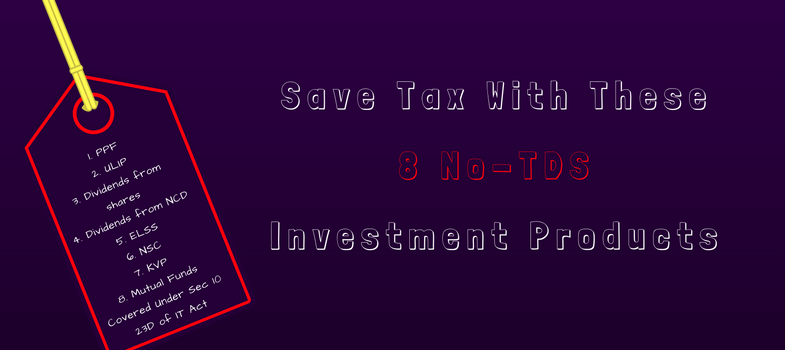Published : August 25, 2017

Tax planning is not an easy work for everyone. It needs skill relating to Indian taxing structure and knowledge of investment products. Through these skills and knowledge, you can manage the additional burden of taxes. Investment products are financial instruments that not only provides vivid investment options but are also the safe source of stable income.
Now, why tax planning is needed at all by anyone?
The simple answer to this question is that if you will not plan then you will end up paying tax on any income above a threshold income slab. And if you plan it then you may save on the quantum of overall tax liability.
Will explain with the help of an example. For instance, consider a salaried individual. Any male having the gross annual income of over Rs.2.5 lac and any women with over Rs.3 lac income needs to pay tax on additional income above the threshold slab. If anyone with above slab income does not plan for tax than a TDS needs to be deducted in this case of income from salary.
Similar is the case with other sources of income. However, the slab may vary for other sources of income. Other sources of income may include income from the profession, an income of a proprietor of a business, income generated on investments by way of interest, rental income and may more.
What TDS stands for?
TDS stands for Tax deducted at source. In India, TDS comes under the jurisdiction of the Central Board of Direct Taxes (CBDT). And in turn, the CBDT is regulated by the Income Tax Act, 1961. CBDT is a part of the Indian Revenue Services which is under the direct jurisdiction of the Ministry of Finance, India.
Besides salary where else TDS is applicable?
TDS is applicable to almost every instrument which is financial in nature, except a few. It is deducted on every kind of bank deposit, recurring, fixed and also on tax savings bank deposits. They are also applicable to a host of instruments including post office deposits.
Some investment products do not attract TDS on invested amount
However, there is no TDS on select financial instruments. Here are the 8 such instruments where there is no TDS on the amount deposited through these investment products. It should be noted that though amount deposited through these products do not attract any TDS, interest earned through some of these instruments attract TDS.
A brief description of seven investment products is being covered here. The details will be covered in separate individual blogs for the same covering their advantages and disadvantages from individual tax saving perspective. Please stay tuned with the https://rmoney.com/ for more recent updates. The brief description of such 8 TDS free investment products are –
First in the list is Public Provident Fund popularly known as PPF. It does not attract TDS and gives you benefits under Section 80C of the Income Tax Act. According to Section 80C of IT Acts income from the interest is tax-free on deposits made towards individuals PPF account. Also, you will get tax benefits of Rs.1.5 lakhs in every financial year.
Second, in the list comes Unit Linked Insurance Plans popularly known by its short name the ULIPS. They are almost alike PPF except for the lock in period. ULIPS have the lock-in period of 5 years, as compared to PPF of 15 years. Its yearly interest income is also tax-free and tax benefits of up to Rs.1.5 lakhs are also there in any fiscal year for an individual’s income.
Yes, dividend income from the shares which you own is TDS free and even tax-free. The dividend is tax-free in the hands of the investors as the company pays dividend distribution tax on behalf of its investors.
Non-Convertible Debentures, the NCDs issued by a company incorporated in India do not attract TDS if held in the electronic form. The interest income earned, however, attracts tax.
You can save tax with Equity Linked Savings Scheme known as ELSS. It qualifies for tax benefits under Sec 80C of the Income Tax Act. Contribution towards this product also is free from TDS. Moreover, the dividends income from ELSS is also tax-free.
Post office issues National Savings Certificate, the NSC as investment options to individual residents. NSE’s have fixed maturity like NCD’s. Also, no TDS is applicable on contribution towards NSC. However, the interest income is not tax-free and is taxable.
The post office saving schemes like KVP or the Kissan Vikas Patra are good investment options to save tax as well. The KVP’s do not attract TDS on the investment made in this instrument. However, the interest income on this instrument is fully taxable.
Mutual funds scheme covered under section 10 23D of Income Tax Act does not attract TDS. So you can also save tax with these schemes and they are good investment option too.
So waiting for what?
Start Investing!!
Seriously

Enjoy flexible trading limits at
lowest brokerage rates ?
Open Your Investments Account Now
0Account Opening Charges
Life Time Demat AMC
Brokerage







Ensure the security of your investments by updating your nominee details in your trading & demat account online. It’s quick and hassle-free!
📌 Act Now to Stay Compliant
For assistance, contact our Customer Care at 0562‑4266666 and email askus@rmoneyindia.com.

IT'S TIME TO HAVE SOME FUN!
Your family deserves this time more than we do.
Share happiness with your family today & come back soon. We will be right here.
Investment to ek bahana hai,
humein to khushiyon ko badhana hai.
E-mail
askus@rmoneyindia.com
Customer Care
+91-9568654321